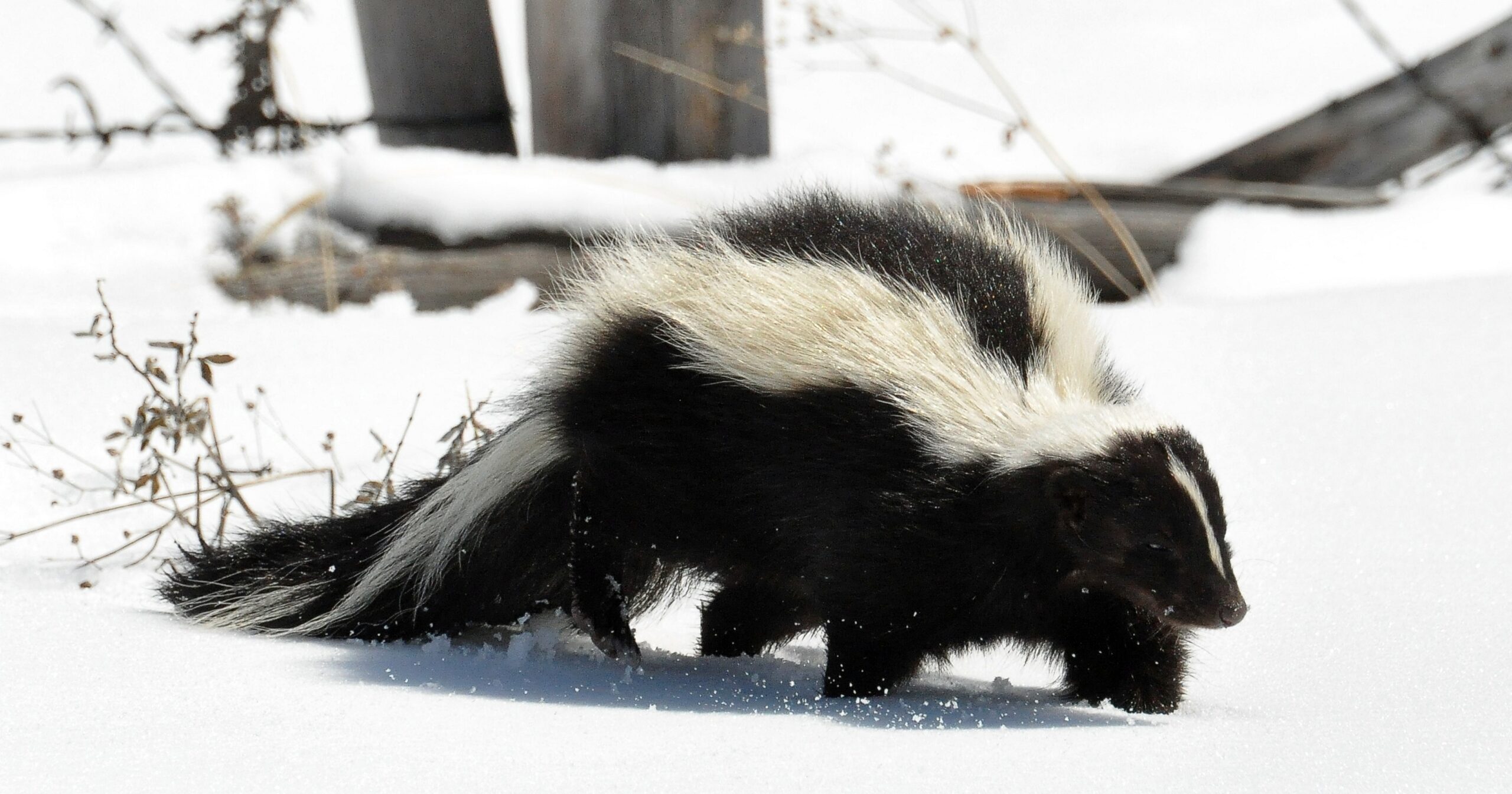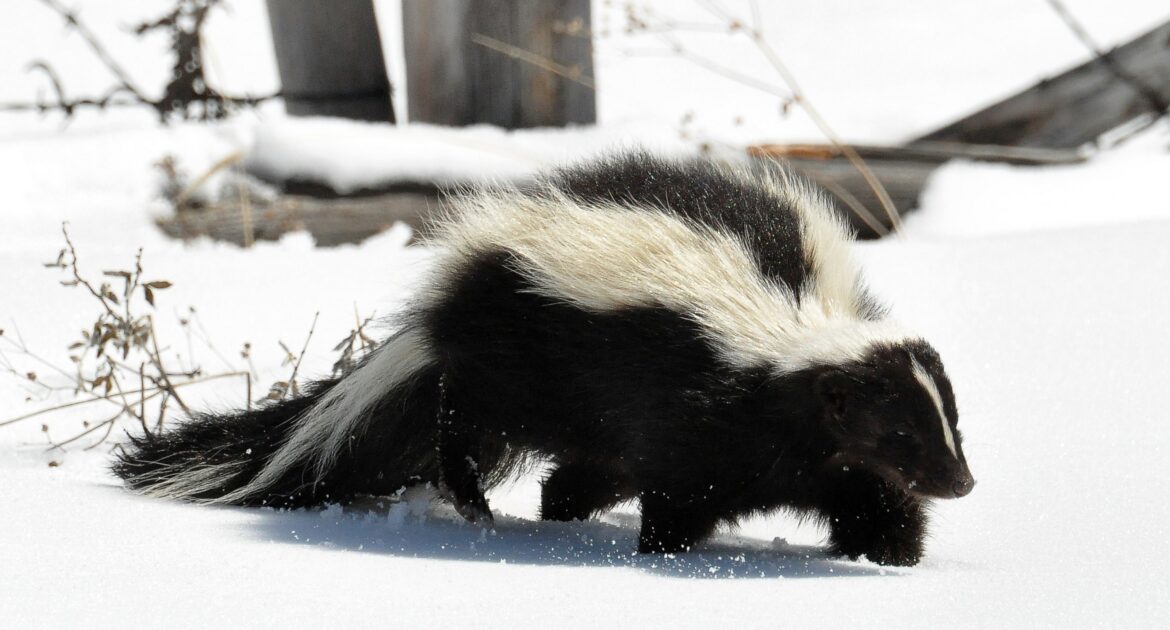A question we often hear from homeowners is, “How do skunks survive the winter?” It’s a fair question, especially if you’re concerned about these striped visitors taking up residence on your property. Understanding their winter habits can provide valuable insights into why they might choose your backyard as a cozy spot.
Do skunks hibernate? While many animals hibernate, skunks take a slightly different approach to surviving the chillier months. Instead of full hibernation, they enter a state of torpor, which allows them to conserve energy while still occasionally waking to forage. This means that while they might not be as active, they’re still very much around.
In this guide, we’ll walk you through the ins and outs of skunk behavior during the colder months. We’ll explore how they manage to find food when the ground is frozen and resources are scarce. We’ll also touch on how they prepare for winter, the importance of their diet, and how you, as a homeowner, can ensure they don’t become permanent guests. And if they do, that’s where our expertise comes into play, providing humane removal services to keep both you and the wildlife safe and sound.
The Winter Behavior of Skunks
Skunks have a fascinating way of dealing with the cold. Unlike some other mammals, they don’t truly hibernate. Instead, they enter a state of torpor. It’s a lighter version of hibernation where their body temperature drops slightly and they become less active but are still able to wake up and move around if the situation calls for it. This state helps them conserve energy during the harshest parts of winter, allowing them to survive without needing to constantly forage for food.
During torpor, skunks retreat to their dens, often shared with other skunks, to maximize warmth. They might use an existing burrow or create their own by digging under structures like decks or sheds. While in their dens, they cluster together, sharing body heat and weathering the coldest nights as a group. This communal lifestyle is temporary, though, and when temperatures rise even slightly, skunks will emerge to search for food.
The winter diet of skunks changes significantly due to the unavailability of their usual sources. In the warmer months, skunks have a varied diet that includes insects, small rodents, fruits, and plants. However, in winter, they rely more on any available sources such as leftover fruits, berries, and whatever small prey they can catch. Their opportunistic feeding habits mean that they’re often seen rummaging through trash or compost piles when natural food sources are scarce.
Preparing for the Chill
Before winter sets in, skunks are busy preparing. They start by fattening up during the fall, eating as much as possible to build up a layer of fat that will sustain them during the leaner months. This preparation phase is crucial because the fat reserves they accumulate are vital for survival when food is limited. For homeowners, this means increased skunk activity during the fall as they forage for food.
Building a suitable den is another important task for skunks as winter approaches. They need a spot that’s dry, sheltered, and protected from predators. Often, they’ll utilize existing structures like abandoned burrows or spaces under porches. However, if such options aren’t available, they won’t hesitate to dig their own burrows, preferably in spots where they can remain undisturbed.
Once they’ve secured a den and fattened up sufficiently, skunks enter their torpor phase, which lasts throughout the winter. During milder weather or periods of warmth, they will awaken and venture out to scavenge for food, ensuring they have enough energy to last until spring. This intermittent activity means that skunks can still be seen during winter, although less frequently than in other seasons.
What Do Skunk Eat in the Winter?
A skunk’s diet is crucial to its ability to survive winter. These creatures are omnivores, which means they eat both plants and animals. This dietary flexibility allows them to adapt to the changes in food availability that occur with the seasons. Before winter sets in, skunks increase their food intake to build up energy reserves. They eat a lot of insects, small mammals, and any fruits or vegetables they can find.
Insects play a significant role in their diet during the warmer months, but as temperatures drop, these become scarce. Skunks then turn to whatever they can find, which often includes human food waste. This is why it’s not uncommon to see signs of skunks rummaging through garbage cans or compost piles in search of a meal. It’s essential for homeowners to secure these potential food sources, as easy access can attract skunks to settle nearby.
The ability of skunks to adjust their eating habits is key to their winter survival. By relying on stored fat and opportunistically feeding when they must, they successfully manage to make it through the winter months. However, this adaptability also makes them more likely to interact with human environments, as our waste often provides an easy meal when natural food sources are buried under snow.
Skunks and Human Habitats
Skunks are versatile when it comes to choosing their living spaces, especially when the weather turns cold. Human habitats often provide the perfect combination of shelter and food availability, making them attractive to skunks looking for a winter den. Structures like barns, sheds, and even attics can become appealing denning sites if they offer warmth and protection.
This proximity to human settlements can lead to conflicts, particularly if skunks decide to take up residence too close for comfort. Homeowners might notice signs of skunk habitation, such as holes dug under porches, tracks in the snow, or that unmistakable musky odor. Even in winter, when skunks are less active, these signs can indicate their presence and necessitate intervention to prevent long-term residency.
While skunks are generally non-aggressive, their defensive spray is a concern for many. It’s a natural deterrent against predators, but it’s also effective at keeping curious pets or people at bay. If a skunk feels threatened, it won’t hesitate to use this defense mechanism. This is why understanding their behavior and taking steps to deter them from settling near your home is crucial.
Why Choose Skedaddle for Wildlife Removal in Minnesota
Choosing Skedaddle means choosing peace of mind. With decades of experience in wildlife removal and management, we’ve established ourselves as leaders in the field. Our team is trained to handle a wide range of wildlife situations, employing techniques that are both effective and humane. We don’t just remove animals; we solve the problem, ensuring it doesn’t come back.
Our approach starts with a thorough inspection to understand the unique challenges of your property. We then develop a tailored plan that addresses these challenges while maintaining respect for the wildlife involved. Whether it’s sealing entry points, advising on habitat modifications, or educating homeowners, Skedaddle covers all bases to prevent recurrences.
Furthermore, our commitment to customer satisfaction is unwavering. We pride ourselves on providing transparent, reliable service that our clients can trust. When you work with Skedaddle, you’re not just hiring a service; you’re joining a community that values humane treatment of wildlife and the security of your home.
Humane and Efficient Solutions
Understanding how skunks stay warm in the winter offers valuable insights into their behavior and the potential challenges they pose to homeowners. By knowing more about their habits, you can take proactive steps to secure your property and prevent unwanted visits. Remember, while skunks are a part of our ecosystem, close encounters can lead to conflict, especially if they take up residence near your home.
If you find yourself dealing with a skunk issue or want to prevent one from arising, consider reaching out to Skedaddle. Our team is equipped with the knowledge and tools necessary to handle skunk problems humanely and efficiently. We’re here to help you achieve peace of mind and maintain a safe, comfortable environment.
With Skedaddle by your side, you can rest assured that your wildlife concerns will be addressed with expertise and care. Reach out to us today to learn more about our services and how we can assist you in managing wildlife on your property.




